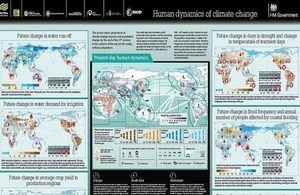Climate Change - Time to act
Mr Giles Lever, British Ambassador to Vietnam delivers an op-ed to call joint efforts to tackle climate change - one of the global challenges.

UK Met Office’s Human Dynamics of Climate Change
Climate change is one of the defining global challenges of our time. It concerns all of us, including modern industrial nations like the UK, and emerging economies such as Vietnam. That is why, as the new British Ambassador, I want to strengthen our bilateral cooperation in this area – and share some thoughts on what the UK is doing both domestically and globally.
The debate among serious scientists is not about whether man-made climate change exists. There is an overwhelming consensus that it does. The debate is about how bad, and how rapid, the impact will be for our societies and our economies.
For South East Asia, the scientific projections are particularly alarming. Failure to reduce global emissions from their current upward trajectory would mean a 4 degree increase in temperature, a 77% increase in land prone to flooding, a 5% increase in drought days and an 8% decrease in water availability for irrigation. And Vietnam is one of the most vulnerable countries to these impacts. Its long coastline and large deltas mean it is easily affected by more intense and frequent natural disasters, rising sea levels, coastal erosion, and salt water intrusion.
According to a climate change impact assessment by MONRE, if the sea level rises by 1 m, about 40% of the Mekong Delta area, 11% of the Red River Delta and 3% of coastal provinces would be inundated (over 20% of Ho Chi Minh City flooded); about 10-12% of Viet Nam’s population would be directly impacted; and the country would lose around 10% of GDP.
The true impact of these projections can be hard to understand if, like me, you are not a specialist. So the UK Met Office has recently launched an online map, the Human Dynamics of Climate Change. I would encourage anyone with an interest to access the tool. It brings to life the scale and the nature of the challenges.
What can the international community do? Our shared objective must be a successful outcome at the UN climate negotiations in Paris in December 2015. This means an agreement that will keep the rise in global temperatures to within 2°C of pre-industrial levels by the end of the century. All countries will need to take on legally binding but differentiated emissions reduction targets that together will achieve that goal.
The UN Secretary General’s upcoming Climate Summit on 23 September provides a unique opportunity for the world’s leaders to come together to reaffirm their commitment to reach an historic deal in Paris, and to further raise awareness of climate change amongst the wider public. As the UK, we would like to see affected countries like Vietnam raising their voices in support of a binding agreement. That is why we have been supporting workshops designed to help build the capacity of climate change negotiators from ASEAN countries.
Agreement at Paris, although essential, will mean nothing unless all counties show ambition at home by doing all they can to plan for and deliver real cuts in their Green House Gas emissions. I’m proud to say that the UK is showing such ambition: our domestic Green House Gas (GHG) emissions are already 26% lower than they were in 1990 and we’ve set ourselves a target of reducing our emissions by 80% by 2050.
We recognise that reducing emissions represents a particularly difficult challenge for countries such as Vietnam, which need to sustain high economic growth rates. That is why the UK has also committed to providing almost £4 billion of international climate finance in the four years to 2016. We are already deploying this funding to help developing countries adapt to climate change and to reduce their emissions.
The message is clear: the time for action on climate change is now. Only by acting together and setting our ambition high, both internationally and domestically, can we avoid a climate future that none of us wants to see, while still growing our economies in a sustainable way. Information on the UK Met Office’s Human Dynamics of Climate Change tool can be found at http://www.metoffice.gov.uk/climate-guide/climate-change/impacts/human-dynamics